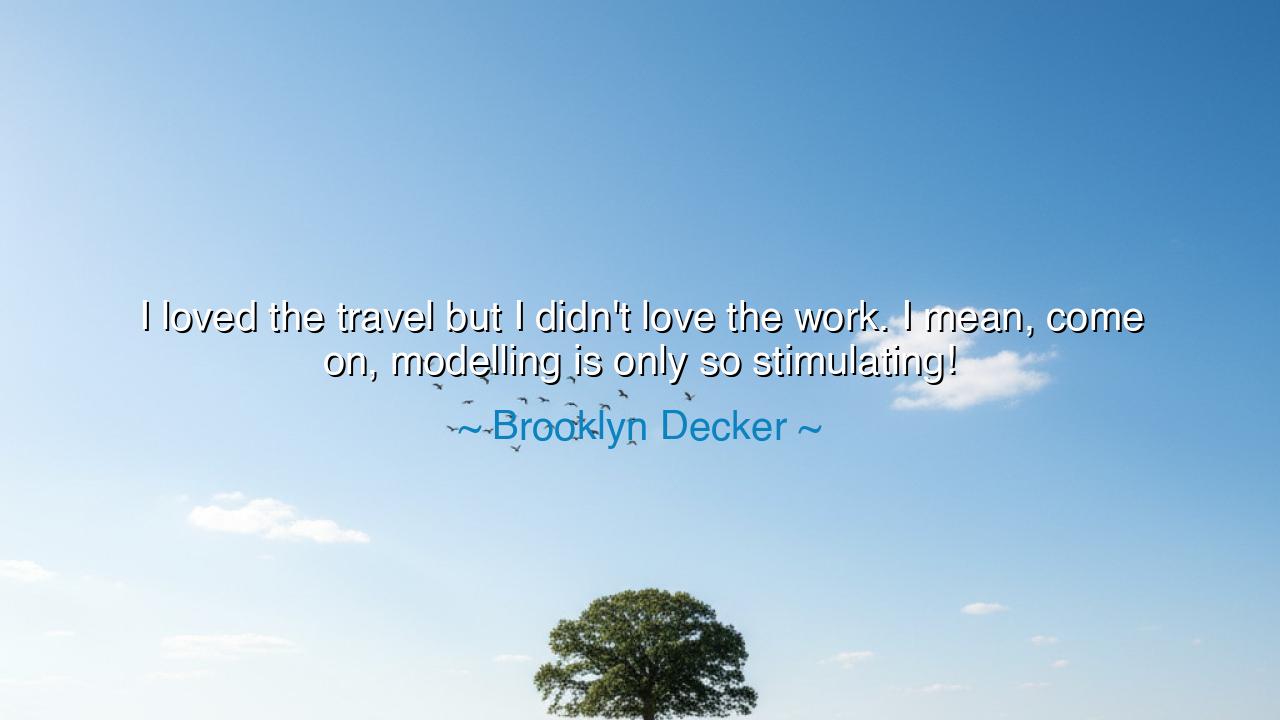
I loved the travel but I didn't love the work. I mean, come on
I loved the travel but I didn't love the work. I mean, come on, modelling is only so stimulating!






The words of Brooklyn Decker ring out with both candor and wisdom: “I loved the travel but I didn’t love the work. I mean, come on, modelling is only so stimulating!” These are not the complaints of one ungrateful for fortune, but the reflection of a soul that has tasted the sweetness of opportunity and found it mingled with emptiness. She speaks here of a paradox ancient and eternal: that the outward trappings of life—glory, beauty, applause—may bring pleasure to the senses, yet still leave the spirit unfed.
To travel is to roam the world, to see the wonders of earth and sky, to step beyond one’s birthplace and walk amidst foreign tongues and distant seas. This, Brooklyn declares, she loved. The journey is a fire that kindles curiosity, a feast for the eyes, a widening of the soul. Yet she contrasts it with the work that bound her—the posing, the staging, the repetition of surface. In modelling, she found little to nourish the deeper hunger of the mind. Her words strike with honesty: beauty without depth is but a painted mask, and labor without meaning soon grows wearisome.
The ancients too knew this truth. Consider the tale of Emperor Marcus Aurelius, ruler of Rome, who held the world’s vastest dominion in his hands. He possessed wealth, armies, and honor beyond measure. Yet in his meditations, he often confessed the weariness of power, saying that true value lay not in the pomp of office, but in virtue, wisdom, and the quiet pursuit of truth. Like Brooklyn, he saw that the outward glory—the crown, the marble halls—were dazzling, yet not endlessly stimulating to the soul.
Her words are a mirror to all who confuse the shell with the seed. The world praises modelling, wealth, and fame as if they were the summit of existence. Yet even one who has stood beneath the lights confesses: “This is not enough.” The hunger of the spirit is greater, the thirst of the mind deeper, the longing of the heart more demanding. Thus we learn that no matter how adorned the path, if it is shallow, it will leave us hollow.
There is no shame in her confession. Indeed, there is strength in her clarity. To admit that a chosen craft does not fulfill the soul is not failure, but awakening. Many labor through their years pretending satisfaction, fearing to name their hunger. Yet Brooklyn speaks boldly: she loved one part, but not the other. This honesty is the spark of change, the seed of growth. To confess is to begin again.
And so, what lesson is offered to us? That we must seek work not only for its rewards, but for its meaning. Love the travel, yes—embrace the beauty, the expansion, the joy. But do not bind yourself to work that leaves your spirit unstirred. Instead, pursue that which challenges your mind, awakens your soul, and keeps your heart alive. For stimulation of the surface fades quickly, but the fire of true purpose burns without end.
Therefore, let each of us examine our own path. Ask: Do I do this only for the outward gift, or does it kindle something within me? Do I labor because the world applauds, or because my spirit is nourished? And if we find ourselves empty, let us not despair—let us, like Brooklyn, speak honestly, and then seek the work that fills us with lasting vitality. For the journey of life is long, and the truest beauty is not in how we are seen, but in how deeply we live.






AAdministratorAdministrator
Welcome, honored guests. Please leave a comment, we will respond soon